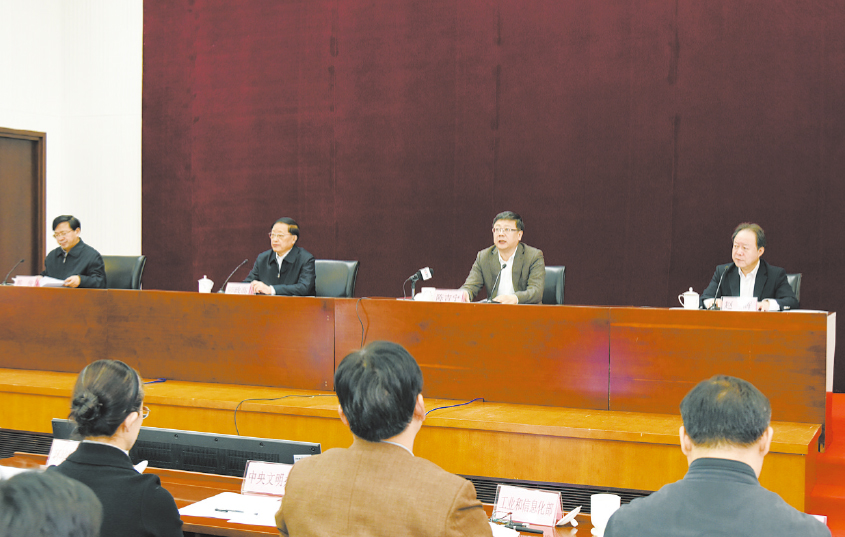
The teleconference on canvassing and treating informal garbage dumps is held in Beijing on Dec. 2, as approved by the State Council. MEP Minister Chen Jining and MHURD Minister Chen Zhenggao deliver remarks at the conference. (Photo by Deng Jia, CENEWS)
Chinese report by Wang Kunting, CENEWS
BEIJING-The teleconference on canvassing and treating informal garbage dumps is held in Beijing on Dec. 2, as approved by the State Council. The meeting thoroughly implemented the guidelines of General Secretary Xi Jinping, carried out the decisions and deployments of the State Council, further aligned thoughts and identified responsibilities, mobilized an all-out investigation into and collective treatment of informal garbage dumps, and made deployments on strengthening the garbage treatment. MEP Minister Chen Jining and MHURD Minister Chen Zhenggao delivered remarks at the conference.
Chen said that garbage treatment is an integral part of rural environmental protection, with which General Secretary Xi Jinping is very much concerned. Xi noted that we need beautiful countryside to build a beautiful country. Therefore, we should do well in the integrated management of rural living environment based on local conditions, change the dirty, messy and bad conditions in the rural areas, and provide a clean and tidy living environment for the rural residents. Premier Li Keqiang and Vice Premier Zhang Gaoli also proposed specific requirements on multiple occasions. According to the deployments of the State Council, MEP worked with MHURD and established an inter-departmental joint meeting mechanism for garbage treatment, mapped out a work plan for canvassing informal garbage dumps, and identified the target, scope, responsible parties, and work requirements of the canvassing. Local areas and State departments will get a thorough understanding of the important instructions of the central leaders and the guidelines of the thematic meetings of the State Council, and in accordance with the said work plan, further align their thoughts, identify responsibilities, and pay close attention to the implementation of it.
Chen required that we will work on four aspects in order to canvass and treat the garbage. First of all, we will take all factors into account and coordinate the canvassing and treatment effort. Local environmental protection departments will enhance communications and work closely with the housing and urban-rural development departments, fulfill their responsibility as the leading agencies, and take the initiative to support and collaborate with other departments on cooperative canvassing and treatment. Second, we will step up the prevention and control of industrial pollution in the countryside. We will launch thematic inspections on the industrial pollution in rural areas, work to locate the township industries in industrial parks, and collect and treat the pollutants. We will work with the police departments to crack down on environmental violations related to hazardous wastes and seriously investigate and punish environmental law and regulation breaches. Third, we will advance the rural environmental infrastructure development. In accordance with the Action Plan for Prevention and Control of Water Pollution, we will lay emphasis on the development of domestic garbage and wastewater treatment facilities in the countryside in the urban-rural fringe areas, environmentally sensitive areas, and river banks where the environmental pollution had great impact and was strongly complained by the public. Fourth, we will set up sound schemes and mechanisms for rural environmental protection. We will push forward the market-based operation of rural environmental management, reinforce the community-level environmental regulatory and enforcement forces, scale up the environmental publicity and guidance, and invigorate the enthusiasms of the villagers in participating in pollution treatment and facility management.
Chen Zhenggao emphasized that local areas will be fully aware of the importance and urgency of the canvassing and treatment effort, and raise the awareness of responsibility. They will take immediate actions, perform their duties, secure financial inputs, build up the teams and enhance guidance by public opinions, and develop innovative schemes and mechanisms in terms of the overall treatment of garbage in urban and rural areas, promoting the garbage classification and resource utilization, and giving incentives for sorting out, collecting and reducing domestic garbage. They will also pay close attention to four major tasks, which is, full-scale canvassing, classifying and treating, enforcement and regulation, and facility development, complete the canvassing by June 2017, and finish the collective treatment by the end of 2020.
Representatives of the member organizations of the inter-departmental joint meetings attended the conference at the main venue. The housing and urban-rural development, and environmental protection departments of all provinces, autonomous regions, municipalities, cities separately listed under State plans, and Xinjiang Production and Construction Corps participated at the branch venues. Beijing municipal government and Sichuan provincial government shared their opinions.